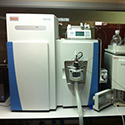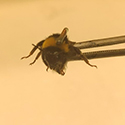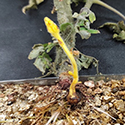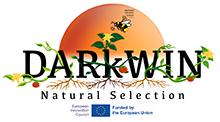Group Plant Hormones
Lines of research

Optimization of the source-sink relations in response to stress:
As organisms fixed to the ground, plants have developed a huge metabolic flexibility in order to adapt themselves to adverse stimulus through substantial changes in the primary and secondary metabolism.
One of the key responses is to reorganize the distribution of assimilates between the autotrophic organisms which produce them (sources), and the heterotrophic organisms actively growing which consume them (sinks).
The root, as sensor organ of such stimulus in the ground, is the first element responding to the edaphic stresses through local and systemic mechanisms, thus leading the plant adaption to the new adverse conditions. While the local responses mainly include changes in the root system architecture (RSA), the systemic responses require communicating by chemical signals (nutrients, hormones and metabolites) with the above-ground part in order to reorganize the source-sink relations, and thus, to adapt themselves to stress. As consequence, these alterations in the root-to-shoot communication and in the source-sink relations have profound effects in the growth and development of the plant, and in the productivity and stability of the crops. The different plant hormones have a crucial role in those processes.
Objectives:
1. Understanding the molecular and physiological processes of plant tolerance to diverse edaphic stresses (eg. salinity, water shortage, nutrient deficiencies) and parasitic plants (broomrapes).
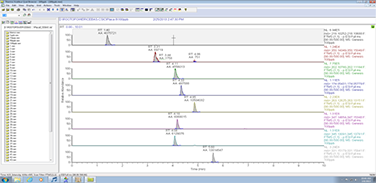
Through the study of contrasting genotypes in their tolerance level to different stresses, or using natural or genetically modified mutants in hormonal functions, changes in root architecture, as well as hormonal, metabolic and transcriptomics in relation to the response to such stresses are studied. Both at the whole plant or through their use as rootstocks, with particular interest in the chemical communication between the root and the shoot, or between the root and the parasitic plants (eg. Phelipanche ramosa).
2. Exploitation of the natural and biotechnological variability in order to minimize the negative impact of different stresses on crop productivity, with special emphasis in the development and application of horticultural rootstocks.
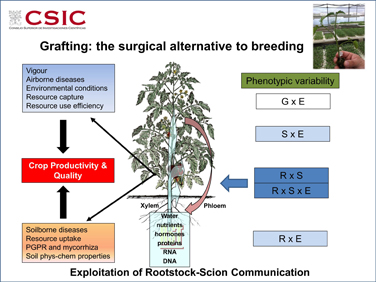
We analyse the intra- and extra-specific variability within the genus Solanum sp. to develop rootstocks that enhance productivity and resource use efficiency through a general increase in vigour or optimising the vegetative / generative balance of elite tomato varieties, or through specific tolerance to salinity, water or nutritional deficit. We particularly focus the alteration of specific hormones in the roots, with special interest in cytokinins, abscisic acid, ethylene and strigolactones.
3. Analysis of source-sink relations through plant x pollinator interaction.
It is a totally new topic that aims to study and exploit the plant x pollinator ecosystem interactions to select and improve crops against adverse environmental conditions.
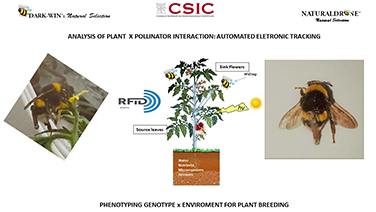
The main bottleneck in plant breeding to obtain varieties that are more tolerant to abiotic stresses is the phenotyping and selection of the most suitable individuals at the different levels of the breeding programs. Based on the hypothesis that the flowers integrate these 'source-sink' relationships through their chemical composition that determines honest signals of energy and nutrient availability for pollinators, it is intended to address the objective of verifying whether the preference of the pollinator for some plants over others reflects the degree of optimization of the source-sink relationships and can serve as a tool to easily select the most favourable individuals by analysing the genotype x environment x pollinator interaction. In addition, the identification of genetic, ionomic, metabolic and hormonal traits in the flowers that correlate with plant resilience and pollinator preference can generate new knowledge about stress tolerance mechanisms, which could be used in breeding programs. By means of the adequate automation of the analysis of the preference of insects this approach could change the current paradigm of plant phenotyping and opens new perspectives for plant/pollinator co-evolution in crop species under a climate change scenario.


